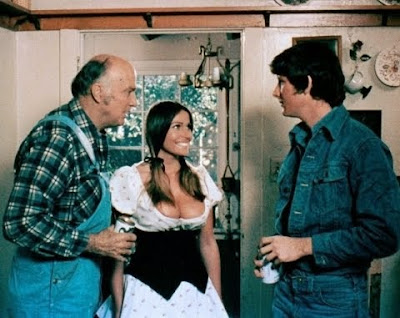Wattstax
The 1973 documentary WATTSTAX, while not exactly "lightning in a bottle", is still an important document of a particular era in a particular (but far from limited to such) environment. Namely, the essentially African-American section of Los Angeles called Watts, unfortunately best known for a series of riots in the mid-1960s. Television viewers may also recall that Watts was the setting for Sanford & Son. WATTSTAX is an effort not only to capture a daylong concert at the L.A. Memorial Coliseum - a festival to celebrate black artists and culture - but also provides interspersed glimpses of the namesake community. A series of candid interviews with locals as they hang out on the front steps or have a meal.
Their words ring with authenticity. They speak of the plight of the black man/woman in a society still adjusting to civil rights, of the awful segregationist history. They don't live in Mayberry, with its feel good moralism. And it isn't just "black versus white." Lengthy discussions of how men of color kill one of their own are explored, for example. Also, in an interesting batch of interviews, several women of differing ages do angrily denounce interracial pairings, how "white women don't understand the black man's games". Most of the speeches are serious, though Richard Pryor is also periodically featured reminiscing about his childhood in Peoria, Illinois, relaying tales in his compelling, uproarious, and inimitable style. It is actually from Pryor that I likely first learned of the reality of American racial relations. I covertly listened to his raw comedy albums, dubbed by my friends on unmarked cassettes. What a bad day, when I was about 13, when my father rifled my room and (randomly?) picked guess which tape to monitor?
Pryor isn't the only familiar face in WATTSTAX: Ted Lange, who would go on to play Isaac the bartender on The Love Boat, sits with the guys in a restaurant and gives his take on The Man and inequality. It's quite funny to see the angry young man, so far removed from his later benign TV persona.
Then, there's the music. Some heard during tours of neighborhood churches. Great gospel hymns. The Staple Singers are on the soundtrack. The concert itself features good performances by, among others, the Bar-Kays, Luther Ingram,
and for the finale, Isaac Hayes (whose climactic "Shaft" number was cut from WATTSTAX's
original release due to some issues with a rival movie studio). Rufus
Thomas sings about cheaters, then singles out a guy who ignores security and plops down on the
field with his umbrella. With a series of funny rhymes ("Get off the fence; it don't make
no sense!"), the singer effectively reverses the usual heckling seen at such events.
With the involvement of producer David L. Wolper and director Mel Stuart (WILLY WONKA AND THE CHOCOLATE FACTORY), you might expect WATTSTAX to play like a clueless outsider's take on ghetto life, a "Ladies and Gentlemen, the Black Community!" bit of patronizing. Some critics feel that way. Aside from a few questionable editing choices, I disagree. I'm not bothered by lingering shots of wiggling thighs and asses in the stands or of artists chowing down on ribs in the back of a limousine. While you may wonder how staged some of the "Man on the Street" segments are, it all comes together not as a slick package, but a sober, intriguing piece of history.
Jesse Jackson takes the Wattstax Music Festival Stage early in the day and gives some good advice during his invocation:
Instead of 'burn baby burn', let's learn baby, learn!



Comments